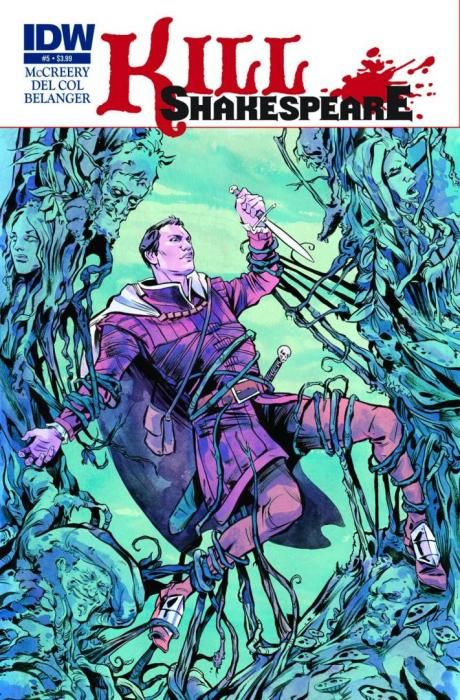Shakespeare's characters live and interact on the page as they inhabit a world where they quest to find the powerful one, Will Shakespeare, and take his magic quill. It's a concept that could either plummet under the weight of impersonation and fanfic-tragedy or it could give artistic license to create some wonderful story with old school tones and interesting tweaks on that which we think we already know. So far, this series has cast its spell with magnificent and authentic results.
The start of this issue resolves a conflict between Othello and Iago from the last cliffhanger. I just can't help but wish that Othello had been written as a more savage character here. There's a complete and open opportunity to do something most writers fear to do and instead it is squandered. You'd either be writing Othello completely off by taking him down a bloody road or you'd be giving him a chance to explore new territory. I could only think of "LOST" and when Sawyer killed it didn't make me think any less of him, so I would have loved Othello for this one act, definitely.
The main lead is Hamlet and my problem is that he feels like a passenger half the time. He's a man of reaction, not action. There is a fantastically drawn and scripted sequence in a boggy marsh where Hamlet is besieged by the ghosts of his own cowardice. It's great to travel down into the psyche of Hamlet as the pressure has built on him but by the issue's end Hamlet feels like a pedestrian again. The other characters bleed off the page as real, especially the hard-nosed Juliet who is just screaming for a solo origin issue.
As Richard the Third's army sweeps through the land looking for a rebellion and the threat that Hamlet may or may not present, we are offered one scene that gives us true villainy of which the bard would have been proud. A poor peasant has his tongue ripped out in the hope of loosening that of the others with him. While this is horrific, what is worse is that Hamlet can only bring himself to watch, and then run. I assume he's being knocked down to make his final fight that more glorious but I'd much rather just follow the warrior child of Juliet through this tale than the spoiled prince.
Belanger's art propels the tale into greater territory as he deftly flips between talking heads, gruesome battle scenes, spectral visitors, and men in frocks. It feels like Belanger never offers us the same page layout. I appreciate his fresh variety of delivery. It keeps the pages of the book dynamic and the story feeling just that bit edgier than old Shakespeare has the right to feel.
Despite having a lead I don't believe in just yet, the rest of this book nails the tongues and tones of the old ways and makes me want to read the next instalment. The Shakespearean dialogue is extremely natural, which should be praised, and the violence is mounting like a tempest on the open fields. This is a smart new book that deserves to be read by many.

